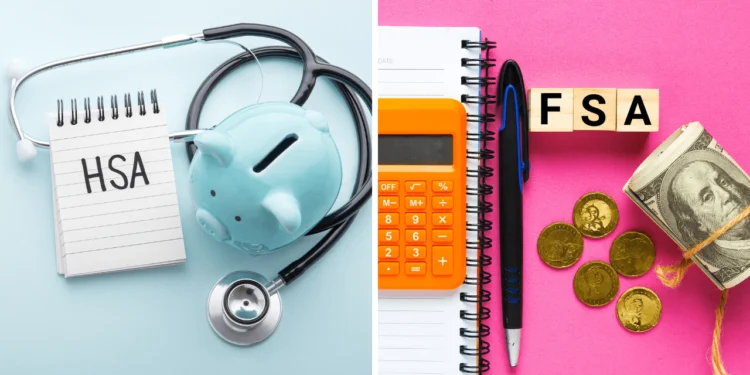Every year, you will have to make certain choices regarding your benefits.
You may have the option of a Health Spending Account (HSA) or a Flexible Savings Account (FSA) as options in your work health benefits. Or you may have one of these accounts simply because someone told you it was good to have.
But it’s important to understand the differences between the two to make sure you are choosing the right account or accounts for what you need.
What are Health Savings Accounts?
A Health Savings Account, also known as an HSA, is a specific type of savings account.
The money in this account can only be used for certain qualified medical expenses. If you have a high-deductible health plan (HDHP), you are eligible to open an HSA. If you do not have an HBHP plan, you cannot contribute to an HSA.
Since an HSA is a savings and investment account with tax benefits, contribution limits exist.
For 2025, an individual can contribute $4,300 to an HSA account. If you have family coverage, you can contribute $8,600 in 2025. If you are an individual 55 or older, you can contribute an additional $1,000.
Your contribution to your HSA is tax-deductible, meaning you don’t have to pay taxes on the money you put into the account.
Your HSA will also grow tax-free, and any withdrawals you make from your HSA for qualified medical expenses are also tax-free. You will not have to pay taxes on any of the money you put in or take out of the account.
HSAs can give you interest if they are set up as savings accounts. You can also invest your contributions in your HSA. Some banks require a certain amount in the account before you invest while also allowing you to invest the right way.
HSA’s have portability. Portability means that your HSA account and the money in it belong to you, not your employer.
This is important because if you ever leave your job, this account follows you and can be used for future medical expenses. You do not have to use your contributions within a certain amount of time. You can use it this year, or you can use it 20 years from now.
3 Health Savings Account Pros
An HSA provides you with the potential for long-term savings to be used for future medical expenses.
Your account can grow as you have it, giving you more savings for medical expense in your retirement.
Depending on the bank, you may be able to invest this money, which can help it grow.
In addition to potential growth through interest and investments, your withdrawals for medical expenses are tax-free, which provides additional savings.
HSA’s are portable, which allows you to always have this account even if you leave your employer or no longer have a high deductible insurance plan.
While you may not be able to contribute to an HSA if you leave your employer, you still have this account to use for future medical needs. You and not your company own this account.
HSAs have a higher contribution limit compared to an FSA.
The higher contribution, along with the portability of the account, allows for more money to be contributed into the account and can grow for future uses.
If you want to have money for future medical expenses and don’t currently have many, an HSA is a great account to have. While you are healthy and have a job, you can max out your contributions and have a nice little nest egg for medical expenses when you are older.
2 Health Savings Account Cons
While having an HSA is a great medical emergency saving, it has its drawbacks.
The first is that you have to have a high-deductible health plan to be eligible for an HSA.
If your employee doesn’t offer this type of insurance plan or you have a medical condition which financially is better to have a low-deductible plan, you won’t be able to open this account.
While the contribution limits are high, this can be a hard amount of money for an individual to contribute over a year. This can be discouraging, and someone may avoid the account altogether.
The money in your HSA can only be used for qualified medical purchases.
They can be a purchase made in the future, but the money cannot be used for anything else. If it is, you may have to pay taxes and a penalty.
What are Flexible Spending Accounts?
A Flexible Spending Account, also known as an FSA, is another type of savings account.
The money in this account can be used to pay for out-of-pocket medical expenses made during that year. An employer offers an FSA for you to be able to have an account.
If your employer offers an FSA, you do not need a certain type of insurance. However, if your employer does not offer an FSA, then you cannot open this account for that year.
Depending on your employer, you may have a certain contribution limit to your FSA. This amount can vary from employer to employer. However, there is still a federal contribution limit that you cannot exceed in a year.
For example, the 2025 contribution limit for an FSA are $3,300.
The contributions you put into an FSA are made on a pre-tax basis. This means that you will not pay any federal or state income tax as well as any payroll taxes. In addition, withdrawals for paying out-of-pocket medical expenses are also not taxed.
An FSA account is a “use it or lose it” account. Any unused funds at the end of a plan year are forfeited. However, depending on your employer, they may offer a rollover grace period to carry over unused FSA funds into the next year.
2 Flexible Savings Account Pros
An FSA is a great way to receive immediate savings.
Contributions towards an FSA are made on a pre-tax basis. You won’t pay taxes on these contributions, which can help lower your overall tax bill.
This is another great benefit if your employer allows you to roll over part of your FSA from the previous year to the current year. Then, if you aren’t able to spend the contributions, you won’t have to be afraid of losing them.
If you have known medical expenses in the coming year, your FSA can pay for those.
They can be used to pay for doctor visits, prescription medications, and even certain medical equipment. Even certain over-the-counter pharmaceuticals can be used with an FSA.
2 Flexible Spending Account Cons
One of the biggest drawbacks of an FSA is the “use it or lose it” policy.
If you do not have many known medical expenses in a year, an FSA may not be worth it.
For example, if you just go to the doctor once a year, get your bi-annual dental cleanings, and go to the eye doctor, you may not use all of the money in your FSA. While the tax savings are great, losing the money at the end of the year can cost you more than the savings.
Along the same lines, an FSA is not portable.
If you leave your employer, you will not be able to use your FSA because it does not technically belong to you.
Updated from Jan 24, 2023


















